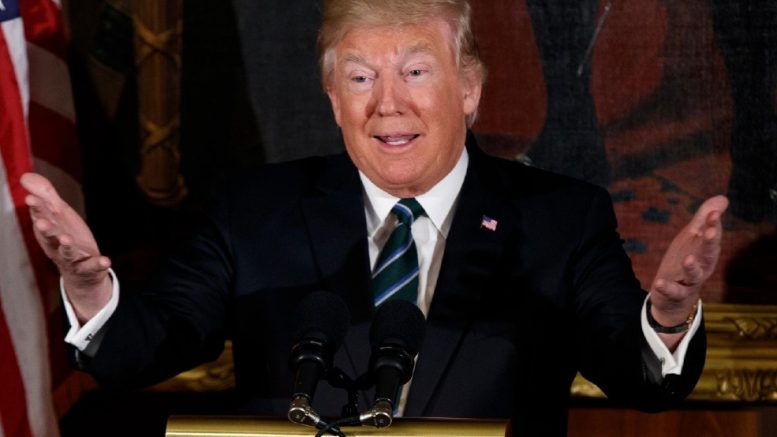Media law experts say Rachel Maddow and David Cay Johnston have little to fear from reports that President Donald Trump is considering legal action over their reporting on his 2005 tax return this week.
Johnston, a Pulitzer Prize-winner and author of a 2016 book on Trump, said the two-page document was mailed to his home anonymously. He currently runs DCReport, a news site devoted to the impact of the Trump administration’s actions on the public.
One of the largest audiences in MSNBC’s history tuned in Tuesday to watch Maddow and Johnston dissect the pages from the president’s 2005 1040 form. Despite longstanding widespread speculation about Trump’s tax records, the document revealed little beyond the fact that he paid a 24 percent effective tax rate on income of about $153 million that year.
Johnston has no idea who sent him the return, and he has floated the possibility that Trump did it himself. The document is clearly stamped “CLIENT COPY,” adding to the intrigue about where it came from.
Minutes before Maddow’s show aired, White House Press Secretary Sean Spicer issued a statement confirming the financial data but declaring MSNBC desperate for ratings and alleging that Johnston and Maddow broke the law.
Trump reiterated that theme in an interview with WWMT Wednesday.
“First of all, it’s illegal to do,” he said. “I just think it’s so disgusting when people can take a tax return – which is supposed to be, almost sacred – and just release it like it’s nothing. I think it’s a terrible thing.”
He also complained about the release of the information to Fox News’ Tucker Carlson, even though it showed that, at least in that year, he paid a higher tax rate than some of his biggest critics.
“I have no idea where they got it, but it’s illegal, and you’re not supposed to have it, and it’s not supposed to be leaked,” Trump said. “And it’s certainly not an embarrassing tax return at all, but it’s an illegal thing. They’ve been doing it, they’ve done it before, and I think it’s a disgrace.”
Federal law does prohibit the publication of personal tax information, but many First Amendment experts and media lawyers believe the press would be protected from legal liability.
That apparently has not stopped Trump attorneys from weighing a lawsuit.
Fox Business reported Thursday that Trump’s legal team believes federal privacy laws were violated. Trump’s personal attorney, Michael Cohen, would neither confirm nor deny to the station that he was considering taking legal action.
Trump attorneys threatened to sue the New York Times last fall when it published part of his 1995 New York tax return, but nothing was ever filed.
Johnston dismissed the White House claim that his reporting was illegal in an interview with Democracy Now Wednesday, saying that there is well-established precedent to support him.
“This is part of the effort by Donald Trump to confuse people and that furthers his very authoritarian views,” he said. “I mean, Donald clearly talks about his office as the president as a dictator.”
If Johnston obtained the document the way he claims, several experts said Friday that he is right.
“It has long been established that journalists in the U.S. can use documents that have been obtained illegally by another party, so long as the journalist did not solicit and/or encourage the other party to do something illegal to obtain the documents,” said Henry Weinstein, a former journalist and a professor of law at the University of California, Irvine.
In addition to the Supreme Court’s ruling on the 1971 reporting about the Pentagon Papers, Weinstein pointed to his own experience covering internal tobacco company documents about the harmful effects of smoking.
“The tobacco companies never attempted to jail me or other journalists I knew who were writing about these issues… Johnston said Sean Spicer’s statements about the right of journalists to use this information were wrong. Mr. Johnston was correct,” he said.
Roy Gutterman, a communications law professor at Syracuse University and director of the Tully Center for Free Speech, said there is “substantial” case law supporting Johnston and Maddow.
“This potential case over the leaked tax returns doesn’t fit into anything that the press could really have liability for,” he said.
Gutterman cited a 2001 Supreme Court case, Bartnicki v. Vopper, where the court ruled the airing of illegally intercepted phone calls was protected as long as the media outlet that received them did not participate in the illegal act.
“We have no facts to support any contention that anybody in the media broke the law to get this information,” he said.
He acknowledged that Hulk Hogan’s successful lawsuit against Gawker over a secret recording creates a wrinkle here, but that is not legally binding precedent and it is not directly comparable.
“We’re not talking about a sex tape here. We’re talking about a tax return for a sitting president,” he said.
According to David Snyder, executive director of the First Amendment Coalition, if the information in question is not “a matter of public interest,” reporting on it might not be protected. Trump is the first president in decades to refuse to release his tax returns, though, and it was a major topic of debate throughout his campaign.
“It’s hard to think of anything that would be of greater public interest than that information,” Snyder said.
Johnston and MSNBC did not respond to requests for comment Friday, but MSNBC told Fox Business, “There is no legal prohibition against journalists publishing these tax returns. It is protected by the First Amendment and Supreme Court precedent.”
Joseph Russomanno, a former broadcast journalist and an associate professor of media law at the Walter Cronkite School of Journalism and Mass Communication at Arizona State University, observed that it is not certain at this point that Johnston’s source broke the law, but that is not ultimately relevant to assessing whether the reporter is legally vulnerable.
“When it comes to matters of public concern, information can be published (i.e., broadcast) when the publisher obtains the information legally, EVEN IF the information was initially obtained illegally by an unknown source,” he said via email.
However, he also cautioned against putting too much stock in a Trump litigation threat.
“Trump is known for threatening lawsuits, often of the frivolous variety. Consider this another one of those,” he said.
As a presidential candidate, Trump threatened to sue the New York Times over several stories, including its tax reporting. He also claimed he was preparing a lawsuit against women who told the Times he allegedly sexually assaulted them. He never pursued any of those suits.
Johnston told the Guardian that Trump—who called Johnston a “weird dude” to WWMT and tweeted that “nobody ever heard of” him—personally threatened to sue him last year over questions he raised about Trump’s finances.
The Donald Trump Libel Threat Clock website has tracked dozens of threats by Trump to sue members of the media and public figures over the last few decades, most of them unfulfilled. According to the site, it has been 140 days since his last public litigation threat.
If he actually did follow through against Johnston and MSNBC, Trump would be the first sitting president since Richard Nixon to sue a media outlet. Nixon’s suit over the Pentagon Papers failed, establishing the heavy burden of proof Trump would need to meet to outweigh First Amendment protections.
Gutterman observed that Trump has a habit of using litigation and the threat of it to intimidate and silence reporters.
“Trump sued members of the media and book authors all the time for defamation,” he said.
Doing so now could open the president up to even more questions about his finances and taxes that he does not want to answer.
“Once the litigation process begins, litigants are subject to discovery and part of the discovery process is depositions,” Gutterman said.
President Bill Clinton tried unsuccessfully to prevent a deposition in a lawsuit filed against him in the 1990s, and Trump would have even less standing to dodge questions under oath if he is the one who files the suit.
“I don’t think you can have it both ways. I don’t think you can be plaintiff in a lawsuit and then come back and say I shouldn’t be subject to a deposition as commander-in-chief,” Gutterman said.
Snyder said he is aware of no legal authority that would protect Trump from a deposition. The defendant fundamentally has a right to depose their accuser, and that risk is one Trump’s lawyers will likely take into consideration.
“If the president files a lawsuit as a plaintiff, I don’t know if there’s anything that prevents the defendant from deposing him,” Snyder said.
The president of the United States taking legal action against the free press for reporting accurately about him sends a dangerous message to the rest of the world, Gutterman said, even if Trump is correct that someone violated his privacy by illegally disclosing his tax return.
“Somebody broke the law, somebody violated a privilege, but suing the press is not the right way to resolve this issue,” he said.
Source: wjla.com




